The poetic nature of cinema is simplified by sports films. People enter such stories already aware of the games on display, so are primed to see beneath the surface. Consequently, dissecting films like Invincible (2006) or Miracle (2004) requires less effort than the works of Andrei Tarkovsky.
Consider what film critic Stephen Holden wrote: “When it comes to capturing the bone-crunching, high-velocity world of sports, Hollywood has a surprisingly spotty record, often preferring to present the game as metaphor… instead of diving into the bruising reality of the arena.”
Movies like Bull Durham (1998) feature characters pontificating on life through symbolic baseball references. Flicks such as The Best of Times (1986) and The Replacements (2004) turn football games into epic tales of second chances. Bend It Like Beckham (2002) and Stick It (2006) convert European football and gymnastics into stories about redefining social paradigms and resisting oppressive conventions. Whip It (2009) and Golden Arm (2020) are less about roller derby and arm wrestling than they are about finding one’s own way in the world even if that path seems strange to others.
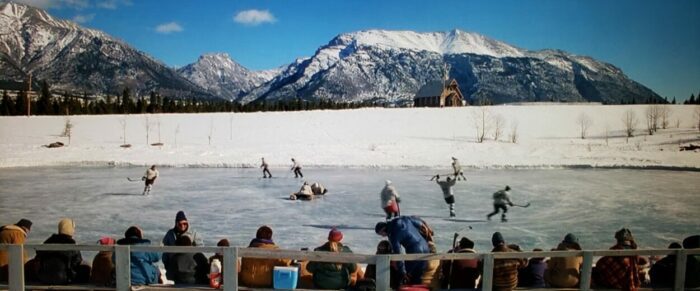
Hockey is an intense game composed of nonstop action and body wrecking brutality. On the ice, something is always in motion, whether players, the puck, or savage goons on the prowl. This shin snapping ballet isn’t easily captured on camera. Filming scenes of the sport requires preparation on par with any action scene. But when the game is captured, the visuals can be emotionally evocative metaphors seeping meaning throughout the movie.
Mystery, Alaska contains many such moments. Although several tales weave into the central notion of hockey, many are character specific. That’s to say each brings focus to some facet of the game’s symbolic potential.
Released in 1999, Mystery, Alaska is about a town bonded by the love of one game. Every Saturday, no matter how murderously cold, residents gather to watch locals compete in a weekly hockey competition on an outdoor pond. The small town’s ritualistic routine is closer to shinny than a professional game, but it still makes their players seem legendary. When an article featuring their hockey team appears in Sports Illustrated magazine, a conniving native son schemes to bring the New York Rangers in to play an exhibition match. The coming competition brings to light many simmering problems in town, but as the team recovers from personal setbacks, they and the community unite into something stronger than before.
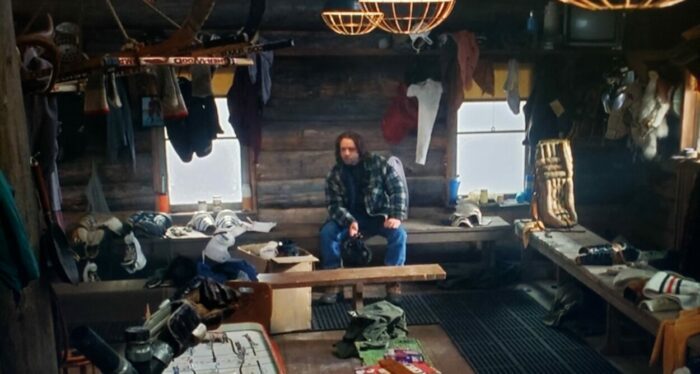
In a certain respect, that makes Mystery, Alaska a village comedy. The overall story is about the town realizing its own worth apart from the wider world. For instance, the frozen pond they usually play on is quickly fenced in by boards covered in ads spoiling the place’s picturesque quality. See, it’s never been about the game so much as what that game represents. Playing on a frozen pond with vast winter shrouded nature surrounding, there’s a beautiful purity to the place ruined by the aesthetics of an NHL arena.
This is a small town in a remote part of Alaska. The salt of the earth population is largely composed of blue-collar folks. Yet, even those higher on the economic ladder share the same values as their neighbors. Mystery, Alaska takes place in an idyllic location, where the outside world is viewed, at best, as a corrupting influence. Yet, that isn’t to say anyone here is perfect. Simply put, they have something special which is symbolically summed up by hockey. It’s rough and tumble bloody play speaks to the character of Mystery’s people, while its setting reminds of the pristine winter wonderland surrounding the town.
Having provided potent performances in films like Romper Stomper (1992), The Quick and the Dead (1995), and L.A. Confidential (1997), Russell Crowe was a rising star at the time. As such, he took the lead of Mystery, Alaska’s ensemble cast. He plays sheriff John Biebe who has captained the local team for more years than anyone else. However, as is custom, it’s finally time for town elders to ask him to step aside, allowing a younger player a chance to shine. Despite being happily married to Donna (Mary McCormack), he begins to feel lost without a role in the Saturday game. And that obvious dissatisfaction takes a toll on his family who see hockey as the most important thing in his life.

This same intense sense of purpose echoes in the role of womanizer “Skank” Marden (Ron Eldard). A local teacher with a tendency to brag about his bedroom antics, he’s eventually forced to confess hockey and fornication are the only things which give his life any meaning. Ron Eldard does a great job during the tragic admission that much of his character’s behavior is attempting to overcome a fear of becoming an irrelevant drunk like his father, a fate he feels certain will arrive when he inevitably gets too old to play hockey. Every skirt he chases, every puck he goes after is a full speed attempt to escape that nightmare.
The sad thing is that it isn’t until these individuals think they’re losing everything they see how much they already have. John recognizes his role as a community leader with a wonderful family by his side. “Skank” realizes his behavior can hurt others and pledges to change (or at the very least, not chase other fellow’s wives). Essentially, they finally see their importance within the community without being hockey players which is the interesting twist in many sports films — players finally realize whatever they’ve been playing has simply been preparing them to handle what’s really important in life.
Along the way is the sacrifice of local lawyer Bailey Pruitt played by Maury Chaykin. He’s the kind of person who happily gives everything to the game. Judge Walter Burns, portrayed by the legendary Burt Reynolds, learns that his stern nature is alienating his children, particularly his hockey player son. Still, what makes these two characters most interesting is a matter of morality.
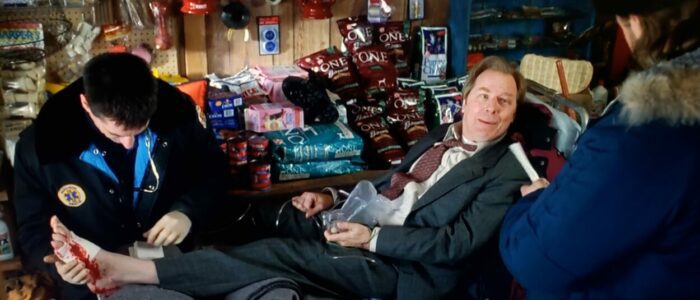
Part of a Mystery, Alaska subplot involves one of the top players on the local team shooting Michael McKean. See, there’s a big-box store sniffing around town, and if it moves in every small business is likely to go under. When McKean arrives as its representative, he gets shot in the foot. Playing on the town’s sympathy for their players as well as their contempt for this corporate intruder, lawyer Pruitt convinces a jury to find the defendant not guilty. Dismayed by the obvious reasoning behind the verdict, Judge Burns goes on recording chastising the town for having lost their moral sensibilities over a hockey game.
It’s something echoed throughout the film’s middle. As the town changes to suit the tastes of a sports channel planning to broadcast the game, the locals start to realize they’re sacrificing themselves. The pure hockey game they love isn’t what’s about to be on display. In fact, they may be setting themselves up for a humiliating defeat. It causes the community as a whole to wonder what matters to them most.
One interesting aspect of this rising concern is changing the team’s name. It’s both a strong point and a weak moment in the film. Mayor Scott Pitcher, played by Colm Meaney, with Sheriff Biebe by his side are initially opposed to changing the team’s name to the Eskimos. Their main reason is that it’ll offend the local indigenous population, several of whom are beloved hockey players. Despite showing a certain cultural sensitivity, it would have been nice if the Native American cast lead by Adam Beach were included in this scene in some capacity as opposed to having Crowe and Meaney speak for them. Yet, the name change goes through in order to satisfy the big money coming into the town, leaving everyone wondering if this is all for the best.
![[L to R] Judith Ivy, Scott Grimes, and Rachel Wilson as the Burns family Joanne, "Birdie", and Marla in Mystery, Alaska (1999). Screen capture off Amazon. Hollywood Pictures/Buena Vista Pictures Distribution. Mother, son, and daughter gathered around the dinner table.](https://filmobsessive.com/wp-content/uploads/2024/02/Mystery-Alaska-12-700x299.jpg)
Coming off the first two Austin Powers movies, director Jay Roach clearly wanted to do something more grounded. Although Mystery, Alaska is a bit comedic, the movie is more drama than raucous laugh riot. Even when goofy it never strays into zany. That seriousness gives weight to certain moments, while comedy provides relief from getting too heavy. Yet, it’s the scenes on the ice which shine better than most movies.
Roach managed to capture the sheer velocity of the game. However, there’s an interesting pace to the play depending on which games the characters are participating in. The practice session early on features them skating with a swift casual abandon. The Saturday games show them going hard but in a playful manner. Finally, the battle between Mystery, Alaska and the New York Rangers is a full-on epic battle. It’s hard to capture the elegant speed and grace of hockey combined with its unforgiving violence, but Roach achieves just that.
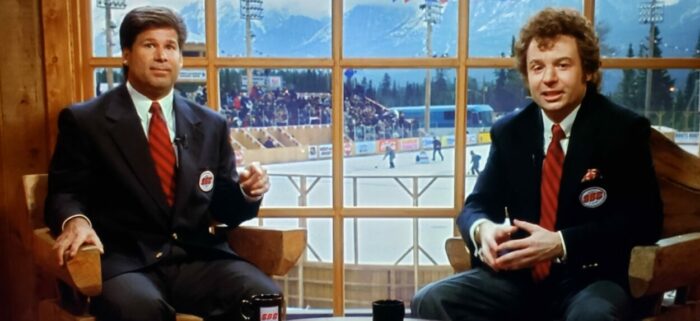
The film isn’t without its flaws. Unable to get real NHL players to appear in the movie, the Mystery team makes zero mention of how they’d conceivably have to play against Wayne Gretzky who spent his final years on the New York Rangers. Mike Myers has a cameo as a hockey commentator spouting gibberish that plain isn’t funny. That said, the biggest weakness of Mystery, Alaska may be that it’s juggling too many metaphorical concepts.
Other films have done better by primarily focusing on one. Youngblood (1986) starring Rob Lowe, Patrick Swayze, and Keanu Reeves zeroes in on a fiery hotshot learning to be a part of the team. The idea of mentoring the next generation is something peripherally addressed in Mystery. Indian Horses (2017) is a far more intimate look at the indigenous connection to the sport. Goon (2011) is an excellent character study centering on finding a place in the world through hockey, a concept broad stroke applied to many in Mystery. Meanwhile, Slap Shot starring Paul Newman and featuring the Hanson Brothers remains the quintessential hockey movie. It’s a tale of second chances, the blinding lights of fame, smalltown pride, and doing anything to keep hope alive.
But what works in Mystery, Alaska’s favor is that it may be the most quietly contemplative hockey movie. Instead of going for comedy that might not have aged well, such as Les Boys (1997), Roach alongside screenwriters David E. Kelley and Sean O’Byrne strived for something intimate. There’s a desire to show how hockey has threaded its way throughout the lives of these small-town folks. That isn’t to say the gameplay lacks any oomph, but it’s pepper spicing the story rather than the sole flavor. In that respect, Mystery, Alaska is closer to Field of Dreams (1989) albeit with far fewer sappy speeches or eye rolling aphorisms.
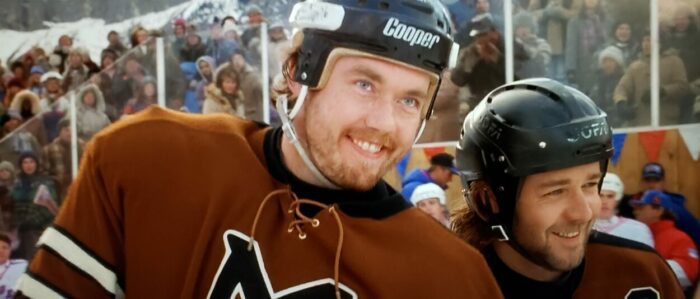
Twenty-five years later, a film like this remains relevant because it shows how well sports incorporate metaphors. When the nature of the game is captured it’s easier to understand what draws people to baseball, football, hockey, etc. But most importantly the best sports movies are never actually about their respective games at all. They’re about the larger aspects of life which swirl about us all, sometimes frighteningly, yet can oddly be simplified or escaped from playing a game. That’s the beauty of Mystery, Alaska.


